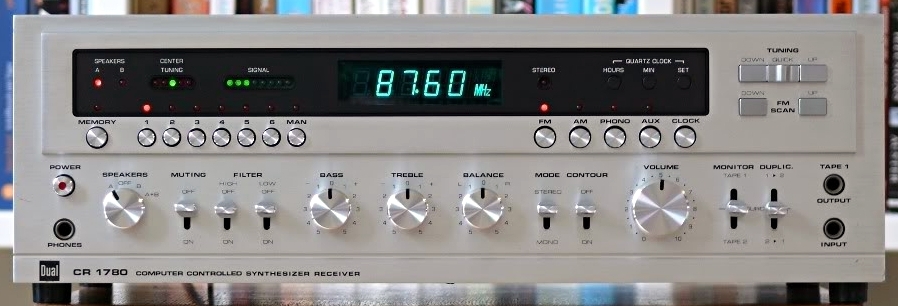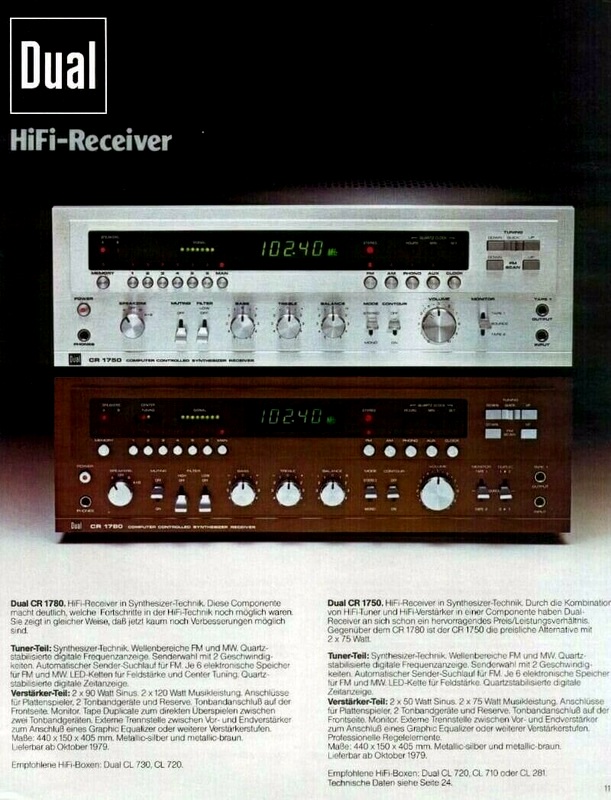Difference between revisions of "Dual CR 1780"
(→Daten) |
|||
| (4 intermediate revisions by 2 users not shown) | |||
| Line 1: | Line 1: | ||
__NOTOC__ | __NOTOC__ | ||
| − | == | + | == Data == |
| − | {{ | + | {{navigation}} |
| − | ''' | + | '''General''' |
| − | * | + | * Manufacturer: [[Dual]] |
| − | * | + | * Model: CR 1780 |
| − | * | + | * Years of manufacture: 1979 - 1981 |
| − | * | + | * Made in: Japan |
| − | * | + | * Color: Metallic silver, Metallic brown |
| − | * | + | * Remote control: no |
| − | * | + | * Power consumption: 450 W (at rated power) |
| − | * | + | * Dimensions: 440 x 150 x 405 mm (WxHxD) |
| − | * | + | * Weight: 14 kg |
| − | * | + | * Original price approx.: 1'398 DM |
| − | ''' | + | '''Connections''' |
| − | * | + | * Number of inputs: |
| − | ** Phono (MM): 1 | + | ** Phono (MM): 1.5 mV / 47 kOhm. |
** AUX, Monitor In, 2x Tape In: 150 mV / 470 kOhm | ** AUX, Monitor In, 2x Tape In: 150 mV / 470 kOhm | ||
** Main In | ** Main In | ||
| − | * | + | * Number of outputs: |
** 2x Tape Out, Monitor Out | ** 2x Tape Out, Monitor Out | ||
** Pre Out | ** Pre Out | ||
| − | ** | + | ** Headphones (6.3 mm jack, front) |
| − | ** 2 | + | ** 2 pairs of speakers |
| − | ''' | + | '''Technical Data''' |
| − | '' | + | ''Amplifier'' |
| − | * | + | * Continuous power (at distortion) |
| − | + | 8 Ohm: 2x 80 W | |
** 4 Ohm: | ** 4 Ohm: | ||
| − | * | + | * Dynamic power |
** 8 Ohm: 2x 120 W | ** 8 Ohm: 2x 120 W | ||
** 4 Ohm: | ** 4 Ohm: | ||
| − | * | + | * Total harmonic distortion: 0.04% (2x 80 W, 1 kHz) |
| − | * | + | * Attenuation factor: > 20 |
| − | * | + | * Frequency response: |
| − | ** 10 - 60 | + | ** 10 - 60,000 Hz (DIN 45 500) |
| − | + | 10 - 40,000 Hz (±1.5 dB) | |
| − | * | + | * Signal-to-noise ratio: (DIN, nominal power) |
| − | ** Phono: | + | ** Phono: > 62 dB |
| − | + | High level: > 80 dB | |
| − | * | + | * Stereo channel separation: |
| − | * | + | * Tone control: |
| − | ** Bass: | + | ** Bass: yes, ±15 dB at 50 Hz |
| − | + | treble: yes, ±15 dB at 15 kHz | |
| − | * Loudness: | + | * Loudness: yes |
| − | * High Filter: | + | * High Filter: yes, -3dB at 8.5 kHz (12 dB/oct) |
| − | * Low Filter | + | * Low Filter: yes, -3dB at 70 Hz (12 dB/oct) |
| − | * Mute: | + | * Subsonic Filter: no |
| + | * Mute: yes | ||
* Direct/Line-Straight: | * Direct/Line-Straight: | ||
''Tuner'' | ''Tuner'' | ||
| − | * | + | * Reception: FM, MW |
| − | * | + | * Frequencies: |
| − | ** | + | ** FM: 87.5 - 104.05 MHz |
| − | + | MW: 513 - 1,602 kHz | |
| − | * | + | * Frequency response: 40 - 12,500 Hz |
| − | * | + | * Input sensitivity: |
| − | ** | + | ** FM: 0.6 µV (mono), 18 µV (stereo). |
| − | + | MW: 15 µV | |
| − | * | + | * Distortion factor: 0.3% (mono/stereo) |
| − | + | Signal-to-noise ratio: 60 dB (mono/stereo) | |
| − | * | + | * Channel separation: |
| − | * | + | * Selectivity: 85 dB |
| − | * | + | * Co-wave selection: |
| − | * | + | * Spurious wave selection: |
| − | * | + | * Image frequency attenuation: 75 dB |
| − | * | + | * IF attenuation: 100 dB |
| − | * AM | + | * AM suppression: |
| − | * | + | * Output level: for TB(1kHz,5mV at phono input) at cinch-> 320mV; at DIN(10kOhm)-> 10mV. |
| − | + | RDS: no | |
| − | * | + | * Station memory: 6 |
| − | ''' | + | '''Special Features''' |
| − | * | + | * Separable pre-/power stage |
| − | + | == Remarks == | |
| − | == | + | * Other models in the same series: |
| − | * | + | * [[Dual CR 1710]] |
* [[Dual CR 1730]] | * [[Dual CR 1730]] | ||
* [[Dual CR 1750]] | * [[Dual CR 1750]] | ||
| Line 89: | Line 90: | ||
| − | == | + | == Pictures == |
| − | * | + | * Image: Dual CR 1780 |
| − | [[ | + | [[File:Dual CR-1780-1.jpg]] |
| − | |||
| − | |||
| − | |||
| + | * Excerpt from brochure: Dual CR 1750 / CR 1780 | ||
| + | [[File:Dual CR-1750-CR-1780-Prospekt-1.jpg]] | ||
| − | |||
| + | == Reports == | ||
| + | The receiver is very heavy with two power supplies and has a quality build. Unfortunately, it does not have a backup battery, for permanently storing transmitters in case of a power failure. However, it does not originate any more from the house DUAL and was manufactured in Japan (presumably with Onkyo) for DUAL. Corresponding notes (Made under DUAL-Specifications in Japan) can also be found on the nameplate, on the back of the unit. In terms of internal construction, this is a typically solid Japanese unit. Its sound can be described (subjectively) as warm and harmonic. Quite a few DUAL fans prefer it to the amplifier/tuner combinations of the DUAL International series (e.g. CV1700 + CT1640, etc.). Also, the aluminium knobs and controls are of considerably better quality than those of the DUAL units produced in Germany. This is especially good for the noble appearance of the receiver, since the turned surfaces of the aluminium knobs - in contrast to the real DUAL devices, where they often appear weathered with age - can be easily restored to their original appearance even after years of use. All in all, this receiver is a very valuable, rock-solid audio device, which is often traded among collectors of DUAL devices as an insider tip in terms of sound and workmanship. | ||
== Links == | == Links == | ||
| − | [[ | + | [[Category:Receiver]] |
Latest revision as of 06:29, 29 December 2020
Data[edit]
General
- Manufacturer: Dual
- Model: CR 1780
- Years of manufacture: 1979 - 1981
- Made in: Japan
- Color: Metallic silver, Metallic brown
- Remote control: no
- Power consumption: 450 W (at rated power)
- Dimensions: 440 x 150 x 405 mm (WxHxD)
- Weight: 14 kg
- Original price approx.: 1'398 DM
Connections
- Number of inputs:
- Phono (MM): 1.5 mV / 47 kOhm.
- AUX, Monitor In, 2x Tape In: 150 mV / 470 kOhm
- Main In
- Number of outputs:
- 2x Tape Out, Monitor Out
- Pre Out
- Headphones (6.3 mm jack, front)
- 2 pairs of speakers
Technical Data
Amplifier
- Continuous power (at distortion)
8 Ohm: 2x 80 W
- 4 Ohm:
- Dynamic power
- 8 Ohm: 2x 120 W
- 4 Ohm:
- Total harmonic distortion: 0.04% (2x 80 W, 1 kHz)
- Attenuation factor: > 20
- Frequency response:
- 10 - 60,000 Hz (DIN 45 500)
10 - 40,000 Hz (±1.5 dB)
- Signal-to-noise ratio: (DIN, nominal power)
- Phono: > 62 dB
High level: > 80 dB
- Stereo channel separation:
- Tone control:
- Bass: yes, ±15 dB at 50 Hz
treble: yes, ±15 dB at 15 kHz
- Loudness: yes
- High Filter: yes, -3dB at 8.5 kHz (12 dB/oct)
- Low Filter: yes, -3dB at 70 Hz (12 dB/oct)
- Subsonic Filter: no
- Mute: yes
- Direct/Line-Straight:
Tuner
- Reception: FM, MW
- Frequencies:
- FM: 87.5 - 104.05 MHz
MW: 513 - 1,602 kHz
- Frequency response: 40 - 12,500 Hz
- Input sensitivity:
- FM: 0.6 µV (mono), 18 µV (stereo).
MW: 15 µV
- Distortion factor: 0.3% (mono/stereo)
Signal-to-noise ratio: 60 dB (mono/stereo)
- Channel separation:
- Selectivity: 85 dB
- Co-wave selection:
- Spurious wave selection:
- Image frequency attenuation: 75 dB
- IF attenuation: 100 dB
- AM suppression:
- Output level: for TB(1kHz,5mV at phono input) at cinch-> 320mV; at DIN(10kOhm)-> 10mV.
RDS: no
- Station memory: 6
Special Features
- Separable pre-/power stage
Remarks[edit]
- Other models in the same series:
- Dual CR 1710
- Dual CR 1730
- Dual CR 1750
- Dual CR 1780
Pictures[edit]
- Image: Dual CR 1780
- Excerpt from brochure: Dual CR 1750 / CR 1780
Reports[edit]
The receiver is very heavy with two power supplies and has a quality build. Unfortunately, it does not have a backup battery, for permanently storing transmitters in case of a power failure. However, it does not originate any more from the house DUAL and was manufactured in Japan (presumably with Onkyo) for DUAL. Corresponding notes (Made under DUAL-Specifications in Japan) can also be found on the nameplate, on the back of the unit. In terms of internal construction, this is a typically solid Japanese unit. Its sound can be described (subjectively) as warm and harmonic. Quite a few DUAL fans prefer it to the amplifier/tuner combinations of the DUAL International series (e.g. CV1700 + CT1640, etc.). Also, the aluminium knobs and controls are of considerably better quality than those of the DUAL units produced in Germany. This is especially good for the noble appearance of the receiver, since the turned surfaces of the aluminium knobs - in contrast to the real DUAL devices, where they often appear weathered with age - can be easily restored to their original appearance even after years of use. All in all, this receiver is a very valuable, rock-solid audio device, which is often traded among collectors of DUAL devices as an insider tip in terms of sound and workmanship.

